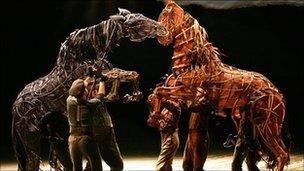Arts Council England says investment offers 'significant return'
- Published

The arts get less than 0.1% of public spending but deliver four times that in gross domestic product, an Arts Council England-commissioned report says.
Analysis by the Centre for Economics and Business Research found the sector had a turnover of £12.4bn in 2011 with £856m coming from tourism alone.
It follows the culture secretary's call for the arts world to focus on its economic case for public funding.
The report comes ahead of next month's government spending review.
In a speech at London's British Museum last month, Culture Secretary Maria Miller said that, rather than focusing on the artistic value of public funding, "when times are tough and money is tight, our focus must be on culture's economic impact".
She told arts executives in a speech they must "hammer home the value of culture to our economy".
The financial pressure faced by arts and cultural organisations as a result of austerity measures is likely to intensify next month when the spending review will give details of which departments will need to cut their spending and by how much.
In March, the Treasury wrote to departments warning most ministers they will have to cut up to 10% of their budgets for 2015-16.
'Fire imaginations'
Tuesday's report, described by Arts Council England as the first comprehensive analysis "to determine the value" of the contribution of arts and culture to the national economy, also found:
- The arts and culture industry employed, on average, the equivalent of 110,600 full‐time employees in the UK from 2008-11 - about 0.45% of total employment
- The sector generated more, per pound invested, "than the health, wholesale and retail, and professional and business services sectors"
- The £12.4bn turnover of businesses in the arts and culture industries in 2011 led to an estimated "gross value added" boost to the economy of £5.9bn
Arts Council England hailed the 0.4% contribution of arts and culture to gross domestic product as "a significant return on the less than 0.1% per cent of government spending invested in the sector".
Chief executive Alan Davey said the organisation funded arts and culture because "they have a unique ability to fire our imaginations, to inspire and entertain us".
"The contribution culture makes to our quality of life, as a society and as individuals, will always be our primary concern," he added.
"But at a time when public finances are under such pressure, it is also right to examine all the benefits that investment in arts and culture can bring - and to consider how we can make the most effective use of that contribution."
He said arts centres and activities "transform our towns and cities and drive regeneration, making the choice to maintain investment in culture a forward thinking one for local authorities".
'Risky projects'
In December, it was announced by the Department for Culture, Media and Sport that Arts Council England would have its funding cut by a further £11.6m before 2015.
It followed reductions already announced in the government's 2010 spending review, which saw the council's budget slashed by almost 30%.
But the report said public funding still played a "vital role in encouraging creative innovation and overcoming private sector reluctance to invest in risky projects".
It provided the opportunity "to explore the potential of new ideas... removing the pressure for new products to always be commercially successful", the report added.
It said "such challenging, innovative work" could go on to huge commercial success, citing the case of the National Theatre's acclaimed production of Michael Morpurgo's War Horse.
"Inspired by puppetry on show at Battersea Arts Centre, this National Theatre production went on to win numerous awards at home and abroad, have sell‐out runs on Broadway and in Toronto, inspire a hit film and is currently touring Australia and Germany," the report added.
- Published24 April 2013
- Published10 December 2012